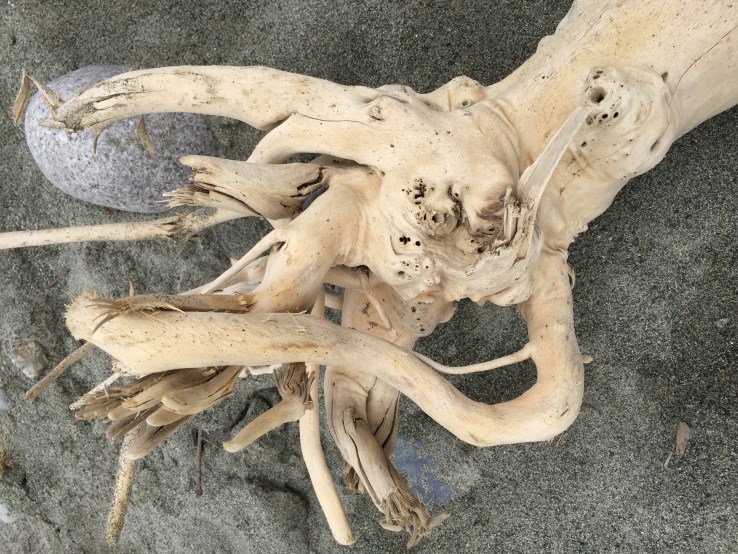
Since my last post:
- I took The Sixth Extinction: An Unnatural History by Elizabeth Kolbert off my shelf and considered whether I should finally read it. I’ve avoided doing so, not because I don’t have the time, but because I already know the dark ending, implicit in the title.
- We learned that a manufacturer’s leaky septic tank has been releasing a plume of heavy metals and a cancer-causing chemical, contaminating some of the groundwater and soil in our former upstate New York town. Testing will determine the extent of the contamination. Fortunately, the affected water is not the drinking water. Ironically, my first audio essay on Terrain.org, “Water Bewitched,” celebrated our neighborhood’s life-giving underground streams and how great it was to raise a family there. I’m not celebrating now.
- We are purchasing a few acres of land, and so we plumbed the mysteries of central Oregon irrigation, which is being modernized for less water waste (because mountain snowpack, an important source of water, will decline with climate change) and to restore flow in area waterways. (Strange timing for us, as we mourned the polluted and possibly dangerous groundwater in our former hometown.) Thanks to irrigation upgrades here and other efforts, a local creek no longer dries up every summer and, as of 2016, steelhead trout and chinook salmon seem to be returning. We’ve had something of a tribute to salmon on this blog of late. For more salmon thoughts, see “The memoir I didn’t want to write about” and Turning Homeward.
- Indoors, I started lavender, rosemary, chives, kale, and pearl onions from seeds. We reclaimed the raised beds in the backyard of the home we’re renting, and so far we’ve planted carrots, spinach, kale, miner’s lettuce, winter lettuce, and maché. Lately, it’s been fun to discover flowers blooming in our yard planted by former tenants.
- I completed the first half of my Oregon Master Naturalist class. For our final essay, we reflected on whether, to save endangered species, we should “transplant” species back into habitats in officially designated wilderness areas. By law, federal wilderness is typically free of human intervention. In my essay, I wrote that carefully selected species transplants are worth a try. In my heart, though, I believe Naomi Klein, “Only mass social movements can save us now.” The question stimulated much discussion and a good share of angst. A classmate doubts moving species around will make a difference, and cited Stephen Hawking: “We must continue to go into space for the future of humanity. I don’t think we will survive another 1000 years without escaping beyond our fragile planet.” Someone else wrote that, given the sixth extinction, hard choices about which species to save are in order. Triage is required, as in medicine. He went on to say that human efforts will ultimately have no meaning and no importance. Wildlife experts, naturalists, climate scientists, and volunteers are grappling with these issues, while many of our government leaders pretend they don’t exist. The cognitive dissonance in our culture is deafening.
The cognitive dissonance in our culture is deafening.
- I put The Sixth Extinction back on my shelf for another day. Sometimes, a book of this nature, no matter how critically acclaimed, is just too much information.
After I posted this, someone in my Oregon Master Naturalist class tweeted this must-read article, “A Moon Shot to Protect Earth’s Species.” If you do not know E. O. Wilson, look him up and try reading one of his books. He’s an author to know about. Click on the link here for one of his TED talks.
And this happened in the book world:
So many readers have loved and were inspired by Sherman Alexie’s The Absolutely True Diary of a Part-Time Indian, especially young Native Americans and members of other often marginalized groups. (Interestingly, every year this book is on the American Library Association’s list of banned and challenged books.) Many of these fans remain blissfully unaware of the scandal that has befallen the author. Those who know about Alexie’s recent troubles have been saddened and disillusioned. Books, their heroic characters, and the talented writers who create them can make a huge difference in a young person’s life. When these heroes fall, it can be devastating. I was impressed by a recent essay that calls out how we lionize and anoint a single spokesperson for a group, when we’d do better to spotlight a diversity of voices: “Why Sherman Alexie’s Sexual Misconduct Seems Like a Betrayal.”
The Pacific Northwest Booksellers Association released its new Event Code of Conduct. It is meant for booksellers, librarians, exhibitors, guests, attendees, and volunteers. The new code states, in part:
“Prohibitive behavior includes offensive verbal comments related to gender, gender identity and expression, age, sexual orientation, disability, physical appearance, body size, ethnicity, and religion; deliberate intimidation, stalking, following, sustained disruption of talks or other events; unwelcome photography or recording, physical contact, or sexual attention.”
Books, their heroic characters, and the talented writers who create them can make a huge difference in a young person’s life. When these heroes fall, it can be devastating.





 I purchased the young adult book
I purchased the young adult book 



